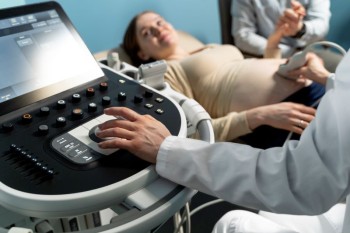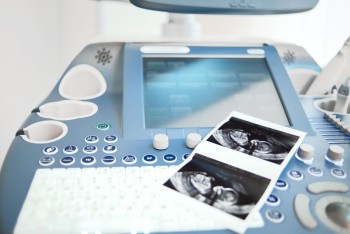
The USG OBS, or Obstetric Scan, is an ultrasound examination specifically tailored for pregnancy monitoring.
Ultrasound / USG OBS (Obstetric Scan) in India with Cost
Ultrasound or USG OBS
(Obstetric Scan) in Detail: Nurturing the Journey of Pregnancy
Embarking on the journey of pregnancy, the Obstetric Scan, commonly known as Ultrasound or USG (Ultrasonography) OBS, emerges as a pivotal tool. This comprehensive guide aims to illuminate the significance, procedure, and invaluable insights that Obstetric Scan provides during the course of pregnancy.
Introduction
The world of prenatal care welcomes a crucial player - the Obstetric Scan, a non-invasive imaging technique that plays a paramount role in monitoring the well-being of both the expecting mother and the developing fetus. This article seeks to delve into the details of the Obstetric Scan, shedding light on its importance and the wealth of information it can offer.
Understanding USG OBS
The USG OBS, or Obstetric Scan, is an ultrasound examination specifically tailored for pregnancy monitoring. It involves the use of sound waves to create real-time images of the developing fetus, placenta, and the surrounding maternal structures.
Importance in Prenatal Care
The significance of the Obstetric Scan lies in its ability to provide crucial information about the health and development of the fetus. It allows healthcare providers to monitor fetal growth, identify potential abnormalities, and offer essential guidance to expectant parents.
Types of USG OBS
Early Pregnancy Scan: Conducted in the first
trimester to confirm pregnancy, estimate gestational age, and detect multiple
pregnancies.
Anomaly Scan (or Mid-Pregnancy Scan): Performed
around 18-20 weeks to assess fetal anatomy, identify potential abnormalities,
and determine the sex of the baby if desired.
3D/4D Scans: Offer a more detailed, three-dimensional view of
the fetus, allowing for enhanced visualization and bonding with the unborn
child.
Preparation for the Scan
The preparation for an Obstetric Scan is typically minimal. Pregnant individuals may be advised to have a full bladder for early scans, aiding in clearer imaging. Comfortable clothing is recommended for ease of access to the abdominal area.
Procedure: A Window into Fetal Development
Gel Application: A clear gel is applied
to the abdomen to facilitate the transmission of sound waves.
Transducer Movements: A handheld
device, called a transducer, is gently moved over the abdominal area, emitting
sound waves that bounce back to create detailed images.
Fetal Measurements: The scan includes measurements such as fetal
size, heart rate, and amniotic fluid levels.
Anatomy Assessment: The healthcare
provider assesses the fetal anatomy, ensuring proper development and
identifying any potential concerns.
Information Offered by USG OBS
Gestational Age: Determines the age of
the fetus, aiding in establishing a timeline for the pregnancy.
Fetal Position: Assesses the baby's position
within the uterus.
Placental Health: Examines the placenta for proper functioning and
placement.
Amniotic Fluid Levels: Ensures the
appropriate amount of amniotic fluid for fetal protection.
Identifying
Abnormalities: Screens for
potential abnormalities or developmental issues.
Benefits of USG OBS
Early Detection: Allows for early
identification of potential issues, enabling timely intervention.
Bonding Experience: Provides an opportunity for parents to bond with the unborn child through visualizations.
Health Monitoring: Enables
healthcare providers to monitor the progress of the pregnancy and adjust care
plans accordingly.
Risks and Considerations
USG OBS is generally considered safe, with minimal risks. The benefits of obtaining crucial information about fetal health often outweigh any potential risks.
Emotional Aspects
The Obstetric Scan is a profoundly emotional experience for expectant parents. Witnessing the visual representation of the developing fetus fosters a deep connection and understanding.
Expert Perspectives
Medical professionals emphasize the importance of Obstetric Scans in ensuring a healthy pregnancy. Their insights contribute to informed decision-making and support for expecting parents.
Technological Advancements
Advancements in ultrasound technology, including 3D and 4D imaging, continually enhance the clarity and precision of Obstetric Scans, providing more detailed information.
Patient Experience
The Obstetric Scan is generally well-tolerated by pregnant individuals. It offers a unique opportunity for parents to witness the growth and development of their unborn child.
Conclusion
In conclusion, the Obstetric Scan plays a crucial role in nurturing the journey of pregnancy. From early confirmations to detailed anatomical assessments, this non-invasive procedure offers a window into fetal development, providing both essential information and emotional connection for expectant parents.
FAQs: Navigating the Journey of Pregnancy with USG OBS
1. Is the Obstetric Scan mandatory for all pregnant individuals?
No, the Obstetric Scan is not mandatory, but it is highly recommended as it provides valuable insights into the health and development of the fetus.
2. How many Obstetric Scans are typically conducted during pregnancy?
It varies, but common scans include the Early Pregnancy Scan, Anomaly Scan around 18-20 weeks, and additional scans if needed based on specific circumstances.
3. Can the Obstetric Scan determine the gender of the baby?
The Anomaly Scan, performed around 18-20 weeks, may reveal the gender if desired by the parents.
4. Are there any risks associated with frequent Obstetric Scans during pregnancy?
While the scans are generally considered safe, excessive or unnecessary scans may pose a theoretical risk. Healthcare providers carefully assess the need for each scan based on individual circumstances.
5. How early can the gender of the baby be determined through the Obstetric Scan?
Gender determination is more accurate during the Anomaly Scan around 18-20 weeks, but it may be challenging to determine earlier.
6. Can the Obstetric Scan detect all potential abnormalities in the fetus?
While the scan is a powerful tool for identifying many abnormalities, it cannot guarantee the detection of every possible condition. Further diagnostic tests may be recommended based on scan results.
7. Is the Obstetric Scan safe for the developing fetus?
Yes, Obstetric Scans are generally considered safe, with minimal risks. The benefits of obtaining crucial information about fetal health often outweigh any potential risks.
8. How long does a typical Obstetric Scan take?
The duration varies based on the type of scan. Early Pregnancy Scans may take around 15-30 minutes, while Anomaly Scans can take up to 45 minutes to an hour.
9. Can the Obstetric Scan detect the presence of twins or multiples?
Yes, the scan can identify the presence of twins or multiples early in pregnancy, providing essential information for prenatal care.
10. Are there any specific preparations needed before an Obstetric Scan?
For early scans, having a full bladder may be recommended for clearer imaging. Comfortable clothing is advisable for easy access to the abdominal area.
11. Can partners or family members attend Obstetric Scans?
In most cases, partners and family members are welcome to attend Obstetric Scans, creating an inclusive and memorable experience for the entire family.
12. What happens if an Obstetric Scan identifies a potential issue?
In the case of identified issues, healthcare providers will discuss the findings with the parents, offer further diagnostic tests if necessary, and develop a care plan tailored to the specific circumstances.
13. Is 3D/4D imaging available to all individuals during pregnancy?
3D/4D imaging is an optional feature and may not be offered routinely. It's often done for bonding and enhanced visualization, providing more detailed images of the baby's features.
14. Can the Obstetric Scan determine the due date of the pregnancy?
Yes, early scans, especially the first-trimester scan, help accurately determine the gestational age, contributing to establishing the due date.
15. Is the Obstetric Scan covered by insurance, or is it an out-of-pocket expense?
In many cases, routine Obstetric Scans are covered by insurance as part of prenatal care. However, it's advisable to check with the insurance provider to confirm coverage.
Navigating pregnancy with the assistance of Obstetric Scans involves understanding, preparation, and collaboration with healthcare providers to ensure the health and well-being of both the expecting mother and the developing fetus.
(0)
Login to continue



